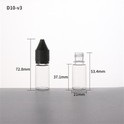Have you ever taken a moment to consider the plastic items in your close vicinity? Plastic objects are quite ubiquitous, fulfilling various roles; from the bags we fill with food supplies to the water bottles we use to maintain our hydration.<br>
However, there could be more to these everyday items than just their utility and environmental concerns.<br>
Hot on the trail of this fascinating research is a team from the Department of Medicine at Danube Private University in Austria.<br>
Their recent investigations suggest that the ordinary habit of drinking water from plastic bottles could be a contributor to a concerning health issue – high blood pressure.<br>
Invisible threats in plastic bottles<br>
It turns out that microplastics from our bottles could gain access to our bloodstream, leading to a rise in our blood pressure levels.<br>
The surprise doesn't end here. These microplastics aren't exclusive to plastic containers; they've been detected in glass bottles as well.
As the study progressed, the researchers observed a drop in blood pressure when the participants switched from drinking from both glass and plastic bottles to consuming tap water.<br>
This revelation makes us question the indirect yet serious health threats posed by these microplastics. After all, high blood pressure is a primary contributor to heart diseases.<br>
Understanding microplastics<br>
Microplastics - tiny plastic particles measuring less than 5mm - are infiltrating our daily lives more than we might realize. These particles stem from various sources, including the wear and tear of car tires, the breakdown of larger plastic waste, and even the washing of synthetic clothing.<br>
Alarmingly, these minuscule plastics are making their way into our food, water, and the air we breathe, leading to unintentional ingestion and inhalation regularly.<br>
The implications of microplastics on human health are still somewhat unclear; however, preliminary research raises significant red flags. Studies have detected microplastics in our bloodstream, organs, and even in the placenta of unborn babies.<br>
This prompts us to ask: what are the potential health risks?<br>
Concerns include inflammation, hormonal disruption, and other complications. While the long-term effects remain largely unknown, the idea that we may be becoming repositories for plastic is indeed troubling.<br>
Navigating the plastics maze<br>
"We concluded, after extensive research, that beverages packaged in plastic bottles should be avoided," warns the Austrian team. They discovered significant patterns as they navigated the complexities of plastics.<br>
A decrease in plastic usage, they found, could potentially lower blood pressure due to a reduction in the number of plastic particles in the bloodstream. The implications of this discovery are not just significant; they could be a matter of life and death.<br>






